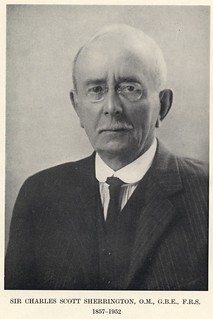- Correspondence Details
-
Sent From (Definite): Sir Charles Scott SherringtonSent To (Definite): F. M. R. WalsheDate: 28 Mar 1947
- Current Holder(s)
-
Holder (Definite): University College London: Special Collections
- No links match your filters. Clear Filters
-
Sent from
 Sir Charles Scott Sherrington
Sir Charles Scott Sherrington
28 Mar 1947
Description:'12 Grassington Road,
Eastbourne.
My Dear Walshe,
You choose a hard question, & one which the bedside is far better placed to solve than is the laboratory. The Py is such a human feature. In Cat & Dog it is a poor thing, in rabbit it is not easily traceable at all below the middle of the spinal branchial enlargement. In the common small monkey there is more, but not much. Rothman's cutting of the pyramids years ago in the dog caused little lasting defect. In Macaque the recovery is surprising, when contrasted with the degree & persistance of the human condition, which is often permanent is it not? But there, I shall not venture to submit remarks on it to yourself - an eminent authority. The French - or some of them - years ago used to teach in the ward that the ;py. tract' was of inhibitory function, & that the attitude of the armin flexion was due to loss of inhibition of flexion. But I fancy that view was little more than hypothesis; by now it may be a thing of the past.
Thank you for the kind letter.
Sincerely yours,
C.S. Sherrington.'
-
Sent to
 F. M. R. Walshe
F. M. R. Walshe
28 Mar 1947
Description:'12 Grassington Road,
Eastbourne.
My Dear Walshe,
You choose a hard question, & one which the bedside is far better placed to solve than is the laboratory. The Py is such a human feature. In Cat & Dog it is a poor thing, in rabbit it is not easily traceable at all below the middle of the spinal branchial enlargement. In the common small monkey there is more, but not much. Rothman's cutting of the pyramids years ago in the dog caused little lasting defect. In Macaque the recovery is surprising, when contrasted with the degree & persistance of the human condition, which is often permanent is it not? But there, I shall not venture to submit remarks on it to yourself - an eminent authority. The French - or some of them - years ago used to teach in the ward that the ;py. tract' was of inhibitory function, & that the attitude of the armin flexion was due to loss of inhibition of flexion. But I fancy that view was little more than hypothesis; by now it may be a thing of the past.
Thank you for the kind letter.
Sincerely yours,
C.S. Sherrington.'







